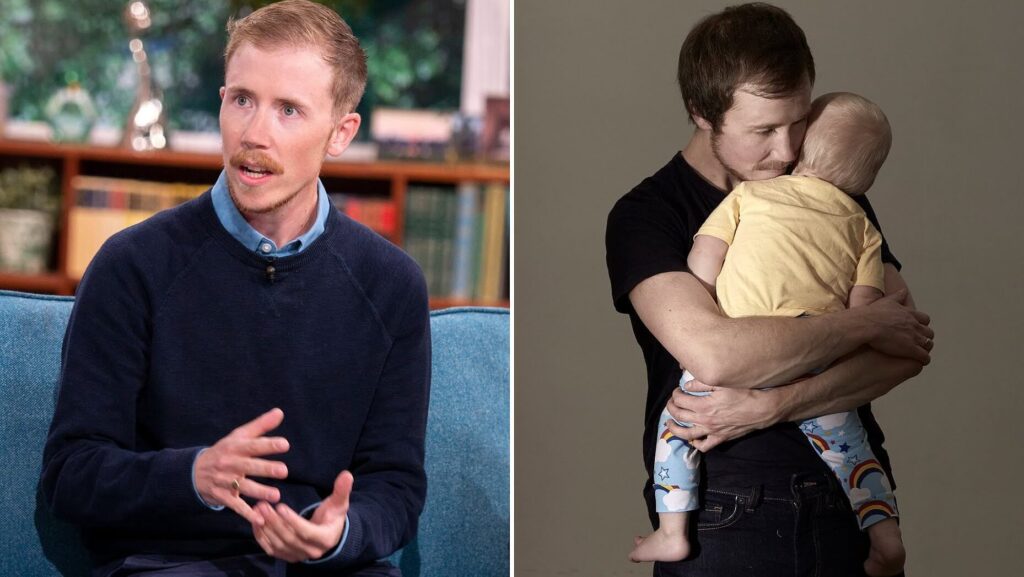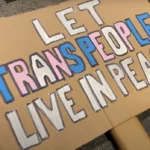Blog Post
Infamous ‘Pregnant Man’ Calls on UK Politicians To Halt Backlash to Trans Agenda
Transgender activist Freddie McConnell issued a plea to UK politicians in the Guardian on July 31, calling on them to step in and block the ongoing backlash to the transgender agenda. Characteristically, the title reeks of emotional blackmail couched in a disingenuous call for debate: “The fight for trans safety is a fight for everyone’s safety—MPs must have the chance to debate it.”
McConnell, you may recall, rose to fame as the first “transgender man” to give birth. After transitioning in 2011 and publicly “presenting” as a slender male with a bushy mustache, McConnell—who is, obviously, female—documented her pregnancy and birth in the 2019 documentary Seahorse, which premiered to groveling elite acclaim at the Tribeca Film Festival.
We haven’t heard as much about the phenomenon of “pregnant men” in the last while. But for a few years, propaganda pieces about trans-identifying women giving birth as ‘men’ were all the rage in the mainstream press in an attempt to normalize the fiction that men could give birth. This, I suspect, was one of those things that turned the public against gender ideology—the demand that we abandon fundamental biological truths and outsource our brains to obviously unstable ideologues.
The transgender wars are by no means over, but LGBT activists have suffered a series of serious setbacks that have triggered panic throughout their movement. That panic is clear in McConnell’s editorial:
The Supreme Court judgment on the application of the 2010 Equality Act has rendered the UK’s system of legal gender recognition entirely hollow. It has ruled that men like me who have gender recognition certificates are defined as women in equality law, which applies to organisations ranging from workplaces to public services and sporting bodies. Vice versa for trans women.
McConnell is not a man, and is no longer recognized as a man, at least not under the 2010 Equality Act. Now, McConnell writes, trans activists may soon face another major setback:
Having run what human rights organisations criticised as an unusually short six-week public consultation, the Equality and Human Rights Commission (EHRC) will soon update its code of practice about how this legal interpretation of the Equality Act will be applied. This will then go to parliament to be approved by ministers, as things stand, with no opportunity for debate.
Thus, McConnell is appealing directly to the politicians, writing that “many trans people live in hope that their MPs are fair, ethical people, who have simply not had the opportunity to fully understand any of this.”
This tone is a far cry from the “eat s**t, TERF!” attitude that has defined the UK trans movement’s thuggish approach to the top-down imposition of their agenda over the past decade, and McConnell’s pleading tone is evidence of just how besieged they have become. A few years ago, trans activists didn’t care less if anyone “understood any of this.” They demanded the public accept it; they crammed it down everyone’s throats.
In fact, trans activists advocated the prosecution of those who disagreed with their ideology. I’m old enough to remember a Scottish construction worker being slapped with an enormous fine merely for laughing at a man in a dress. And a UK veteran being arrested for “causing anxiety” to trans activists with a social media post. And a former cop being arrested for a “transphobic” limerick he posted on Twitter. That’s not to mention the street-level violence waged against women who disagreed with them. The list goes on.
Trans activists were not misunderstood. We understood them, loud and clear. Their current invitation to discussion is convenient, insincere, and entirely strategic.
Now, activists are falling back to the tried-and-true tactic of insisting that declining to affirm their chosen identities is a physical threat. McConnell noted that an effort is underway to personally lobby MPs, and that “Trans Solidarity Alliance’s director, Jude Guaitamacchi, described the conversations in stark terms: ‘It’s ‘Look me in the eye and tell me you’re willing to destroy my life.’’” We’ve heard this all before: Support sex changes for minors, or ‘trans kids’ will commit suicide. Endorse my agenda or be complicit in trans genocide.
This tactic, which proved almost unbelievably effective for several years, has also begun to lose its potency. Despite an all-hands-on-deck effort to persuade legislators that a ban on puberty blockers for minors would result in the suicides of “trans children,” the evidence presented by the Cass Review and follow-up research on debunking the suicide myth was so overwhelming that the blackmail failed. The emergency ban passed by the Tories was affirmed by the pro-LGBT Labour government, and the medical consensus has begun, slowly but inexorably, to shift.
Hilariously, McConnell even attempts to claim that LGBT activists—a movement so powerful that politicians genuflect to their leaders every June and national flags are swapped out for rainbow flags—are somehow the underdog. “Over the past 10 years, their rights have been chipped away in Britain, their lives made increasingly difficult by anti-trans lobbyists with more influential connections and far more money,” she writes. “Systemic transphobia has captured our public institutions with terrifying speed. For its part, the Supreme Court refused to hear any interventions from trans people before deciding on its recent, devastating ruling. Things were so different in 2016.”
Indeed, they were. In 2016, ordinary Britons were being arrested by a thoroughly queered police force and prosecuted by a judiciary captured by trans ideology. Overnight, transgender ideology swept through the institutions and was implemented on a population that couldn’t name a fraction of the new genders even if they wanted to. The attitude of McConnell and her fellow activists was sheer triumphalism. They sneered at women who brought up concerns. They called rape survivors bigots. They refused to listen. And now, they’re losing.
READ THE REST OF THIS COLUMN AT THE EUROPEAN CONSERVATIVE








